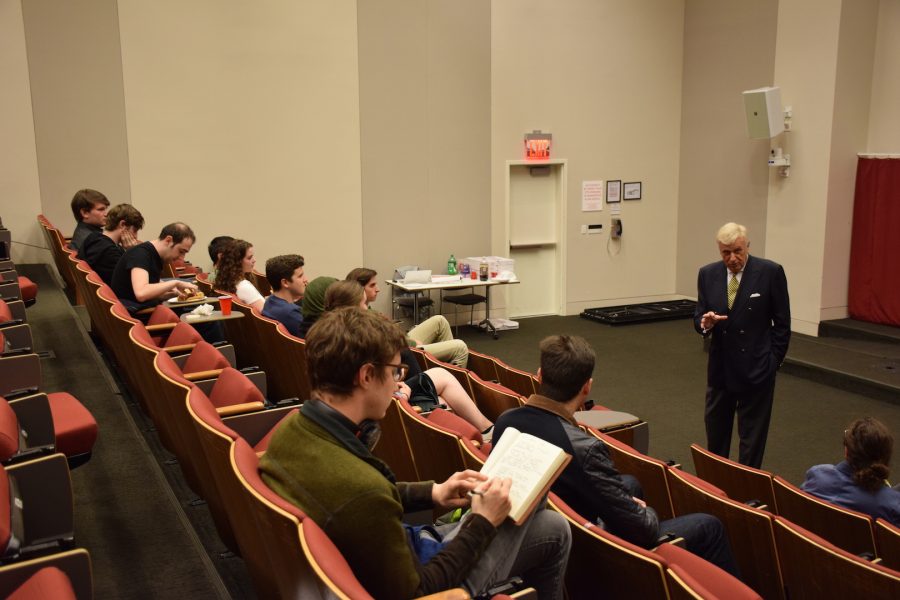Founder of Gallatin Might Not Fit Well in a Gallatin Classroom
Gallatin School of Individualized Study Founder Herb London spoke with students about Gallatin’s history and his views on foreign policy.
April 27, 2016
Herbert London, founder of the Gallatin School of Individualized Study, held a highly contested discussion on Tuesday during a meeting of The Review and Debate Series, as students weren’t keen on his views on foreign policy.
London founded Gallatin in 1972 as a program within NYU with the idea in mind that students should read 87 key texts from Western scholars to obtain the ability to cross disciplinary borders. He later worked heavily in conservative think tanks and now runs his own London Center for Policy Research.
Throughout the discussion, London remarked that opinions on college campus are too homogenous.
“After the Vietnam War, I started to see an orthodoxy on college campuses, and it made me — and still makes me — very uncomfortable,” London said. “I am astonished that there is this homogenous opinion. This is the herd of independent thinkers. They all think they’re independent thinkers and they all think the exact same way.”
While some audience members agreed on this point, other students said some of London’s comments seemed at odds with Gallatin’s culture today, which frequently includes coursework that interrogates the concept of American exceptionalism and encourages students to draw from a global range of scholarly texts.
For example, London recounted an anecdote about a woman from Saudi Arabia who was forced to marry a man 40 years her senior and was later surprised when a man in Holland held open a door for her, saying “ladies first” because she had never heard that expression before.
London said such experiences influenced his worldview. He said he considers himself a patriot, and he concluded with the following statement that drew heat from the crowd.
“The West is superior,” London said. “But try to go into a New York University classroom and say that.”
CAS junior Krishna Kulkarni challenged London and said London had generalized in his view, and demonized an entire faith group based on unfair and essentially ahistorical facts.
“In the same breath you talked about how [Muslims in Saudi Arabia] oppress women and how they’re a valuable ally to the United States,” Kulkarni said. “The U.S. actually helped create a regime that is oppressive towards women and has actively spread extremism throughout the region.”
Kulkarni also questioned London’s exclusion of non-Western texts in an ideal university curriculum.
“Frankly, what makes a great book?” Kulkarni said. “I understand that Shakespeare is important, but the world does not stop at the border of Western Europe.”
In response, London said that the United States had supported Saudi Arabia and the oppression of women in large part because of the country’s need for Saudi oil, deeming this the pragmatic side of foreign policy.
“Was it the right thing to do?” London said. “I’m not so sure. I believe that there are great writers all around the world, but the essential questions of life: Who are we? How do we leave our mark? Do I have a place on this globe? Those questions are asked most formidably and most interestingly by the West.”
After the talk, CAS junior Michael DeLuca said he agreed with London’s points on the homogeneity of opinion on university campuses, but found it harder to find common ground once he started talking about foreign policy.
“I think the interdisciplinary approach [of Gallatin] that integrates cross-cultural dialogue and international perspectives is essential in the world we live in,” DeLuca said. “The sort of distinctions that he draws are problematic because they’re sort of divisive.”
Email Jeffrey Kopp at [email protected].



























































































































































